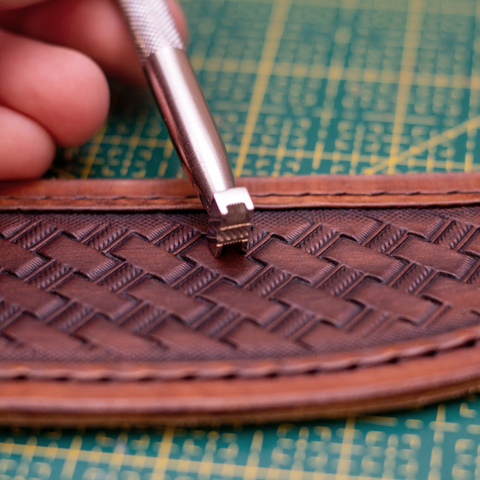Beginner's Stamping for Leather Crafting
Antonia MarinoGetting Started with Metal Stamping on Veg-Tanned Leather
Metal stamping is a popular leathercraft technique that adds texture and character to veg-tanned leather. In this guide, we’ll walk you through the basics so you can start stamping your own designs with confidence.
First, you’ll need veg-tanned leather. This type of leather is perfect for stamping because it holds impressions beautifully. You’ll also need metal stamps, typically made from hardened steel, available in a wide range of shapes and sizes.
Before stamping, prepare your leather by cutting it to size. Lightly dampen the entire piece with a sponge or spray bottle—just enough to soften it without soaking. This helps avoid water marks or uneven colour and makes the leather more receptive to the stamp.

Place your leather on a sturdy surface, like a granite slab or cutting board, for solid support. Position your metal stamp where you want the design, hold it steady, and strike once firmly with a mallet or maul. A single clean hit is better than repeated taps—too much force could slip or distort the design.
Practice on scrap leather first to get the feel for your tools. Play around with pressure and angles for varied effects—lighter taps for subtle details, heavier strikes for bold impressions. Mix and match stamp shapes to create your own unique patterns.
Keep checking your progress as you work. If the leather starts drying out, dampen it slightly to prevent cracking. Tackle one section at a time and don’t rush—slow and steady stamping gives the best results.
Once you’re happy with the design, leave the leather to dry completely. This might take several hours or overnight, depending on the weather. Avoid using heat to speed things up, as this can cause shrinking or warping.
After drying, you can embellish your piece further—dye it, antique it, paint it, or finish it with a protective sealant. Try a few techniques to see what works best for your project.
Metal stamping is a satisfying skill that adds depth and creativity to your leatherwork. With a little practice, you’ll soon be turning plain leather into stunning, personalised pieces.

